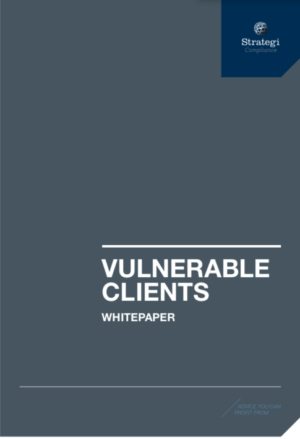The FMA’s regulatory framework firmly places the onus on financial advice providers to meet client needs and deliver good outcomes for vulnerable clients, concludes a white paper released by training company Strategi.
The document – Vulnerable Clients – says that due to the Covid-19 crisis, along with existing demographic changes within New Zealand, it is becoming more likely that vulnerable clients will form part of a financial adviser’s client base. It recommends that their “…customer vulnerability practices are up to scratch”.
The white paper says: “The FMA has noted this as a priority, releasing an information sheet in June highlighting its expectations that financial services firms prioritise a review of customer vulnerability practices in light of the Covid-19 crisis.
“The increased financial pressure on individuals due to income shocks or health implications from the pandemic, as well as New Zealand’s ageing population and growth in minority communities, is also behind the expected increase.”

What’s more, says the paper’s author, a range of Covid-19 scams have been circulating, looking to prey on the vulnerable.
“So having robust practices, processes and policies in place is essential,” says Strategi.
According to the UK Financial Conduct Authority the definition of a vulnerable client is; “a person, that due to personal circumstances, is especially susceptible to detriment, particularly when the adviser/business is not acting with the appropriate level of care”. This definition has been adopted by the FMA.
According to the white paper, one in four people face literacy difficulties, one in six can be diagnosed with a common mental disorder, and 10% of all people aged over 65 will experience some form of elder abuse.
Therefore, it is more important than ever to define your approach to treating vulnerable clients fairly…
In addition, according to a 2018 report by the Commission for Financial Capability, 68% of people have money worries, and 47% were worried about job security (one can assume those figures have risen this year).
Strategi says Covid-19 is likely to result in a greater proportion of the population displaying vulnerable characteristics, both through income shock (job losses) and health implications.
According to Statistics NZ, unemployment in Q3 of 2020 is expected to rise to 9.5% – a 5.5% increase on Q1.
“If we consider one of the drivers of vulnerability to be income shock, then it is likely that a greater proportion of financial service provider clients are at risk of becoming vulnerable,” says the report’s author.
“Therefore, it is more important than ever to define your approach to treating vulnerable clients fairly and with the appropriate level of care to help them achieve good outcomes.”
The paper lists some of the things advisers should consider when attempting to identify a vulnerable client.
It says some of the cues which may indicate vulnerability include:
- Changes in payment habits, such as late or missed payments
- A lack of response from the client or the client is uncontactable
- The client says they don’t understand emails/ letters/policy documents
- The client asks the same question repeatedly
- Changes occur to withdrawal habits, for example, larger amounts are withdrawn more frequently
- There is signs of anxiety such as shortness of breath
“The fluid and complex nature of vulnerability means that people can move in and out of meeting the definition of vulnerability during your professional relationship with them,” says the paper. “This again can make it difficult to identify exactly when extra care needs to be taken.”
Staff can feel uncomfortable asking clients questions that may be perceived as personal…
The report’s author writes: “Staff can feel uncomfortable asking clients questions that may be perceived as personal, for fear of upsetting them.
“However, with the right training, staff can learn how to ask these questions in a sensitive manner that helps the client feel able to divulge whether the service needs to be adapted for them.
“Taking a holistic approach to dealing with vulnerable clients is fundamental to good practice. Every level of your business should understand the role they play in delivering good results to these clients.
“Vulnerable clients need to be considered throughout the whole client journey and in all interactions. This includes from how you design products, through to how advice is delivered.”





